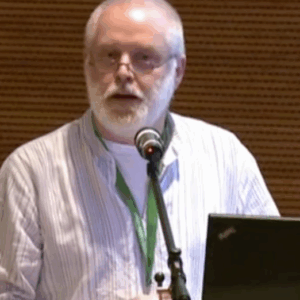
Brian Murphy – aka BrianSpecMan – is a technician and architect by training, specification writer by choice, university lecturer/studio tutor, author and environmentalist by action!
Brian provides training in sustainable construction through his business GBE Learning and is the founder and creator of Green Building Encyclopaedia, a growing information resource about creating a healthy, environment.
Brian is also a member of The Green Register’s steering group.
Tom Westwood, Programme Manager and Co-Director of The Green Register met with Brian to reflect on the challenges, achievements and progress since The Green Register was first set up, 25 years ago this October. Celebrate 25 years at the opening night of our new exhibition!
When were you first aware of the Green Register?
“In 1999 I met Lucy Pedler (Founder of the Green Register) during the planning for a conference run by Building Design Magazine called ‘Green is the colour’ at the RIBA. I was asked to talk about regulations and standards in sustainable construction, and at the time there was almost nothing. Lucy invited me alongside other enthusiastic green construction advocates to be a trainer on the Green Register’s first courses.
“I had previously been working as a specification consultant including on wood for the British Library, and the advice available on sustainable sources and treatments was severely lacking, so I knew the industry needed more. My ambition since then had been to build a green building encyclopaedia, and meeting like-minded people like Lucy gave me the opportunity to make that a reality.”
What is the most important thing the Green Register (TGR) has achieved?
“I would say there are three. Firstly, still going after 25 years is an achievement in itself!
“Secondly, Lucy’s belief in collaboration, and that all those in the green construction space could and should work together towards a common goal with initiatives such as the sustainable development group.
“Thirdly the training courses, particularly those aimed at builders, as TGR had realised this was an essential group that they were not reaching as much. It’s great to see this focus still developing with the Retrofit Skills course and to see government funding growing for such training, which might persuade builders they could afford to take time out to train.
What have you learnt at a Green Register training event that you still use today?
“Absolutely 1000s of things! All the training events are phenomenal at keeping me up to date with new developments and changes, allowing me to further disseminate knowledge through my own CPDs, jargon busters and checklists.
“There are so many new initiatives, products, construction methods and apps out there, and I only wish I had time to attend more events. I can’t say enough about how good TGR training is, and how they are able to keep adding new topics.”
Who have you met through the Green Register that you’ve gone on to work with?
“Cath Hassell for one, who I’ve worked with to deliver training together from our different specialisms. And Gillian Mitchell who I’ve worked with on house refurbishments, and we’ve also discussed the concept of practice specifications; giving practices a tool they can use to build their own specification library to help their efficiency and quality control. We also ran site waste management workshops for contractors.
“People will also approach me who’ve been on one of my training courses – one said, ‘you changed my life’ because I’d delivered with gusto and enthusiasm which had persuaded them to change direction.”
What role can the Green Register play in the sector over the coming years?
“More of the same! Online events are helping reach a wider audience, whilst in person events are a great way to meet people you might be able to work with. But beyond that, to advise the RIBA (Royal Institute of British Architects) & ARB (Architect’s Registration Board) on sustainability training, alongside organisations like ACAN (Architects Climate Action Network) and Architects Declare who are also well placed to advise them.
“It’s important to go beyond awareness to increasing competencies, both in the industry and in universities. Experts need to be paid to provide training, and tutors in universities need to have the knowledge and skills to train their students, or the budget to pull in experts to teach, such that gaining these skills is embedded in syllabuses.”
What one development would you like to see in sustainable construction?
“Beyond the above, making LCAs (Lifetime Carbon Assessments) easier for the industry to undertake. The RICS standards are complex and may be putting some practitioners off. LETI’s (London Energy Transformation Initiative) system is much more user friendly and has ambition, setting both embodied and operational carbon targets for us to meet the climate change challenge.
“In terms of enforcement, people have written carbon policy templates for Local Authorities to use in their planning policies to help them push industry. With many local authorities being cash strapped, we could make it easier for them to administer sustainable planning and building control solutions by providing information in the most digestible format.”
Published September 2025

